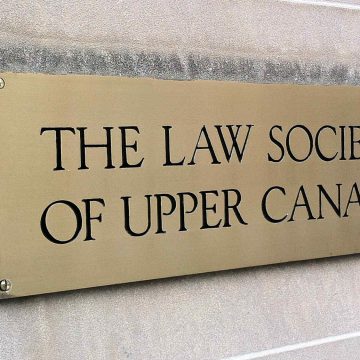In case you haven’t checked your email lately, you have work to do. When filing next year’s annual report to the Law Society of Upper Canada, every lawyer in Ontario has to submit a personal “Statement of Principles” on diversity and inclusion. Each statement must acknowledge your obligation to equality, diversity and inclusion — both in general and in your behaviour toward employees, clients and the public.
This new requirement is one of the suggestions put forward in the Law Society’s report on systemic racism in the profession. To help lawyers meet this requirement, the Law Society has provided two sample statements that practitioners can use, though they are welcome to modify the language or write one from scratch.
My advice? Don’t simply copy and paste the template. If that was your plan, I don’t fault you. When you’re forced to do something, it’s easy to miss why it’s so important.
Case in point: a recent column in the National Post described this new requirement as a violation of our right to free speech. The author argues that to compel a lawyer to make a commitment to diversity and to actively promote diversity crosses the line — and that, if the Law Society imposed sanctions on those who failed to submit a statement, it may be “unconstitutional.”
I agree that we shouldn’t force people to promote opinions they don’t hold. However, as lawyers, we should also be open to hearing the merits of all sides of an issue. The profession is a journey for each of us. Why shouldn’t we, instead, treat this as an opportunity to write our own statement of principles, one that you can stand behind?
After all, that’s what I intend to do. To demonstrate why I think this exercise is so valuable, I’d like to share three clauses I plan to include in my own statement of principles.
- I acknowledge that, as a lawyer, I am part of both my community and my profession. It is my responsibility as an advocate to promote and advance equality, diversity, and inclusion, because this is an issue that affects the community around me.
Diversity matters to our communities and the world around us. When an area like the Peel Region, whose population is 57 percent racialized, has only three minority judges serving at its Ontario Court of Justice, it matters. When police officers disproportionately card young, racialized men and women who can’t access lawyers that can understand their perspective, it matters. When I hear members of the bar openly ask why we need foreign-trained lawyers in the Ontario legal profession, it matters. And it matters every time a racialized, female lawyer is mistaken as a note-taker or translator in a courtroom.
- I acknowledge that for every privilege associated with being a member of the legal profession comes an equal amount of responsibility and obligation. I acknowledge that, by law, we are under a duty to treat clients, employees and those seeking membership in the vocational associations that I am part of equally and without discrimination.
If, as the National Post column suggests, forcing an opinion on diversity is a violation of our constitutional rights, then let’s consider the entire picture that comes with the constitution. Section 15 gives us the right to be treated equally on the basis of race, among other things, by our government. Under the Ontario Human Rights Code, we have legal obligations to refrain from treating an individual differently based on race in the course of employment, membership in a vocational association, and/or the provision of goods and services (for instance, during interactions with clients).
The report on racialized licensees demonstrates that the rights of certain members of our profession are violated every single day — both when looking for work and interacting with clients, bosses and colleagues. We cannot ignore this discrimination. It’s happening right in front of us and we seem to have accepted as a fact of life. We must do better.
- I acknowledge that in the course of this obligation to promote diversity, equality and inclusion, it is also important to help those that may face struggles and barriers to inclusion. Fostering mentorship, advocacy, and community are part of my personal values towards diversity.
I went to law school in the U.K. When I started looking for an articling position, I noticed that “foreign trained” students — especially those who were newcomers to Canada — disproportionately landed jobs with sole practitioners and at small firms outside of Toronto. Many even articled for free. The barriers I saw don’t even scratch the surface of what the report on racialized licensees found.
The first few years of a legal career are so important. The lessons you learn, the mentorship you receive, the things you are taught about ethics — all of these things shape the lawyer you will become. No one should go through this period, or indeed any point in their career, feeling like an outsider.
If you’re not sure what to write as your statement of principles, take a few minutes and think back on your own career path and how you can ensure others have the same opportunities. I’m sure you’ll find the opinions you need — and you likely won’t need to rely on a template for them either.
 Richa Sandill is an employment and human-rights lawyer at MacDonald & Associates. She also sits on the South Asian Bar Association of Toronto’s board of directors.
Richa Sandill is an employment and human-rights lawyer at MacDonald & Associates. She also sits on the South Asian Bar Association of Toronto’s board of directors.


